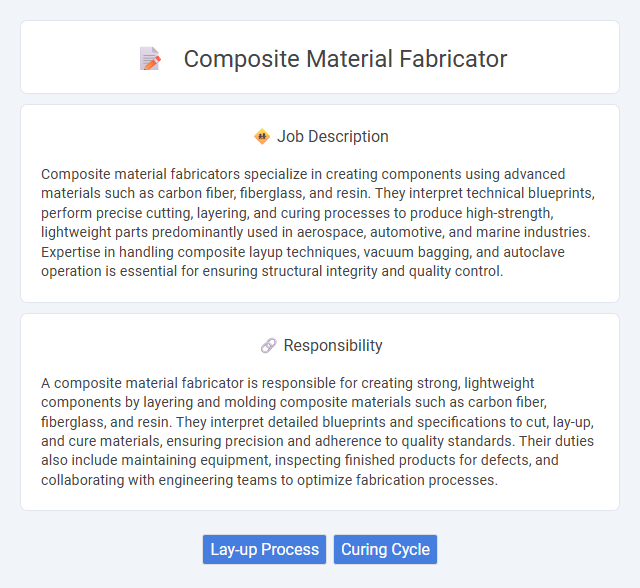
Composite material fabricators specialize in creating components using advanced materials such as carbon fiber, fiberglass, and resin. They interpret technical blueprints, perform precise cutting, layering, and curing processes to produce high-strength, lightweight parts predominantly used in aerospace, automotive, and marine industries. Expertise in handling composite layup techniques, vacuum bagging, and autoclave operation is essential for ensuring structural integrity and quality control.
Individuals with strong attention to detail and good hand-eye coordination are likely suitable for a composite material fabricator job. Those comfortable working in physically demanding environments and standing for extended periods may find this role a better fit. People prone to allergies or respiratory issues might face challenges due to possible exposure to resins and fibers used in composite manufacturing.
Qualification
Expertise in composite material fabrication requires a strong foundation in materials science, particularly knowledge of fiberglass, carbon fiber, and resin systems. Candidates should possess technical skills in cutting, layering, and curing composite fabrics, alongside proficiency with specialized tools and equipment used in the fabrication process. Certification or training in composite technology and experience with quality control standards such as ASTM or ISO significantly enhance a fabricator's qualifications.
Responsibility
A composite material fabricator is responsible for creating strong, lightweight components by layering and molding composite materials such as carbon fiber, fiberglass, and resin. They interpret detailed blueprints and specifications to cut, lay-up, and cure materials, ensuring precision and adherence to quality standards. Their duties also include maintaining equipment, inspecting finished products for defects, and collaborating with engineering teams to optimize fabrication processes.
Benefit
Working as a composite material fabricator likely offers benefits such as hands-on experience with advanced materials and potential for specialization in aerospace, automotive, or marine industries. Opportunities for career growth and skill development in cutting-edge manufacturing techniques may also be available. Competitive salaries and job stability could be common in this growing field.
Challenge
Working as a composite material fabricator likely involves addressing complex challenges related to precision and quality control during material layering and curing processes. The role probably requires troubleshooting manufacturing inconsistencies, which can affect the strength and durability of the final product. Adapting to evolving technologies and maintaining strict safety standards are challenges that fabricators often encounter in this field.
Career Advancement
Composite material fabricators develop expertise in advanced manufacturing techniques for aerospace, automotive, and renewable energy industries. Mastery of materials such as carbon fiber, fiberglass, and epoxy resins opens pathways to roles like quality control specialist, production supervisor, or research and development engineer. Continuous skill enhancement and certifications in composite technology significantly boost opportunities for leadership positions and specialized engineering careers.
Key Terms
Lay-up Process
A composite material fabricator specializing in the lay-up process meticulously arranges fiber reinforcements and resin on molds to create high-strength, lightweight structures used in aerospace, automotive, and marine industries. Mastery of hand and automated lay-up techniques ensures optimal fiber orientation and resin distribution, critical for the structural integrity of components. Knowledge of curing cycles, material compatibility, and defect inspection drives quality control and enhances the performance of composite assemblies.
Curing Cycle
A composite material fabricator expertly manages the curing cycle to ensure optimal resin hardening and composite integrity. Precise control of temperature, pressure, and time during the curing process directly influences the mechanical properties and quality of the final composite product. Mastery of curing parameters minimizes defects like porosity and delamination, enhancing durability and performance in aerospace, automotive, and construction applications.
 kuljobs.com
kuljobs.com